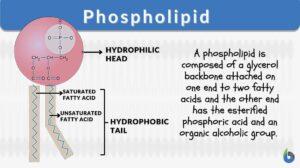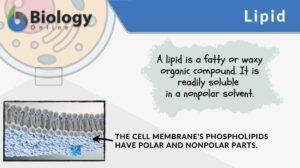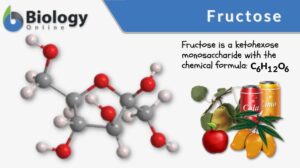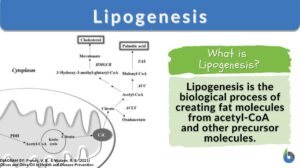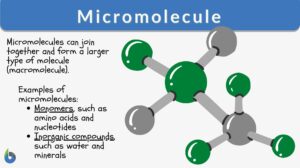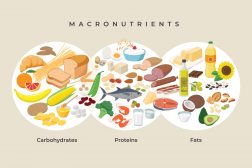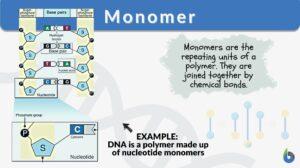Search Results for: glycerol
Glycerolipid
Definition noun, plural: glycerolipids A type of lipid made up of a glycerol linked esterically to a fatty acid Supplement A... Read More
Phospholipid
What is a phospholipid? Phospholipids are a subgroup of lipids. Other major types of lipids are fatty acids, sphingolipids,... Read More
Triglyceride
Definition noun, plural: triglycerides An energy-rich compound made up of a single molecule of glycerol and three molecules... Read More
Digestive Enzymes
Have you ever thought about what happens to the food after you have taken it into your mouth? How those big steak pieces... Read More
Lipogenesis
Lipogenesis Definition Lipogenesis is the process of producing lipid or fat to store biochemical energy for later metabolic... Read More
Diglyceride
Definition noun, plural: diglycerides A glyceride consisting of a glycerol and two fatty acid molecules joined through ester... Read More
Diacylglycerol
Diacylglycerol glycerol substituted on the 1 and 2 hydroxyl groups with long chain fatty acyl residues. Dag is a normal... Read More
Intrinsic protein
Definition noun, plural: intrinsic proteins Any of the group of integral membrane proteins that facilitate specific... Read More
Eubacteria
Eubacteria are prokaryotic microorganisms consisting of a single cell lacking a nucleus and containing DNA is a single... Read More
Glyceroglycolipid
Definition noun, plural: glyceroglycolipids A type of glycolipid made up of an acetylated or non-acetylated glycerol and at... Read More
Monoglyceride
Definition noun, plural: monoglycerides A glyceride consisting of a glycerol and a molecule of fatty acid joined via an... Read More
Micromolecule
Micromolecules Definition How to define micromolecule? Micromolecules are relatively small molecules that are combined... Read More
Chemical Composition of the Body
In order to fully understand the mechanisms of human physiology, it is important to have an understanding of the chemical... Read More
A Balanced Diet – Carbohydrates and Fat
Alongside the numerous vitamins that are required as part of a healthy diet, we must also eat food containing a variety of... Read More
Fatty acid
Definition noun plural: fatty acids'' fatty acid, ˈfætɪ ˈæsɪd Any of the group of a long chain of hydrocarbon... Read More
Catabolism
Catabolism Definition Catabolism is the branch of the metabolic process that breaks down complex, big molecules into... Read More
White adipose tissue
Definition noun, plural: white adipose tissues A type of adipose tissue found in mammals used to store energy and acts as... Read More
Fluid mosaic model
Fluid Mosaic Model Definition What is the fluid mosaic model? The fluid mosaic model is a three-dimensional representation... Read More
Dehydration reaction
What is dehydration synthesis? A dehydration reaction is a form of biochemical reaction wherein a water molecule is lost or... Read More
Amphipathic
Amphipathic Definition Amphipathic is a word used to describe a chemical compound containing both polar (water-soluble) and... Read More
Glycolysis
What is Glycolysis and Why is it Important? Glycolysis is a metabolic pathway by which the 6-carbon molecule of glucose is... Read More
Regulation of Organic Metabolism, Growth and Energy Balance
Organic Metabolism Events of Absorptive and Post-absorptive States. The absorptive state is the period during which... Read More
Krebs cycle
Krebs cycle, also known as the citric acid cycle or tricarboxylic acid (TCA) cycle, is a fundamental metabolic pathway that... Read More
Protein Activity and Cellular Metabolism
Protein Binding Sites The ability of various molecules and ions to bind to specific sites on the protein surface forms the... Read More
Pancreatic lipase
Definition noun, plural: pancreatic lipases A pancreatic enzyme that splits dietary fats by hydrolyzing triacyglycerol... Read More
Staphylococcus epidermidis
Definition Noun A gram-positive facultative bacterium that produced slime for adhesions associated with endocarditis and... Read More
Endomembrane system
Ever wondered how biomolecules are made within the cell and then they are released outside the cell for use by the body?... Read More
Glycolipid
Definition noun, plural: glycolipids A carbohydrate, usually an oligosaccharide, that is covalently linked to a lipid... Read More
Sphingolipid
Definition noun plural: sphingolipids sphin·go·lip·id A type of lipid with a sphingoid base (e.g. sphingosine and... Read More

